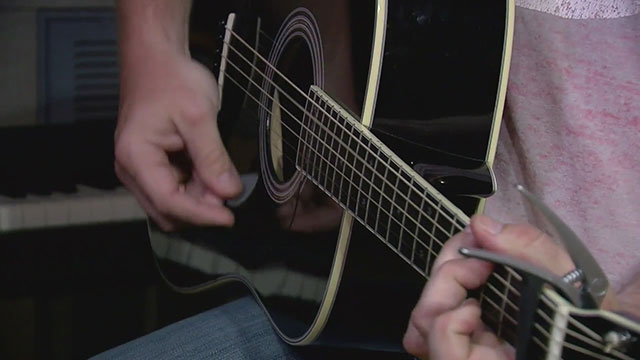
Nashville, TENN. (WKRN) — Artificial intelligence is rocking the music business. Industry leaders have been meeting with lawmakers about national legislation so AI and musicians can have a healthy working relationship.
In a tough business it’s safe to say that Songwriter Jamie Moore has made it.
“My job is to make you dance, to make you cry, to make you laugh,” said Moore.
The four-time Grammy nominated artist has written songs performed by Florida Georgia Line, Morgan Wallen and Carrie Underwood, to name a few.
“The ones that are instant are special,” said Moore, talking about songwriting.
📧 Have breaking come to you: Subscribe to News 2 email alerts →
But Moore isn’t resting on his laurels. He’s working harder than ever, concerned that AI could one day take his job.”
“For what I do, it’s picking up on phrasing, it’s picking up on rhythm, melodic sensibilities. It’s really getting smart,” said Moore. “Will any of us have a job in the next two years?”
“AI is here. And we have to find a balance,” said Bart Herbison.
Bart Herbison is executive director of the Nashville Songwriters Association International.
“I think songwriters are smart, and they think it can be a useful tool. But, I also don’t think it’s hyperbole to say they are freaking out over it. We’ve got to get some regulations put around this,” said Herbison.
And that effort is underway. Herbison recently traveled to Washington D.C. with songwriters to share their concerns with lawmakers, and progress is being made. Federal legislation called The NO FAKES Act is in its early stages. If passed, it could give artists property rights over their name, image, likeness and voice. In the Senate, Republican Marsha Blackburn and Democrat Chris Coons are behind the effort.
⏩ Read today’s top stories on wkrn.com
“It’s a smart approach, because we need to find the areas where we can get consensus. We’ve got to start with something. And the NO FAKES Act, both on the House and Senate side, seem to be very well received.”
“So, it gives us some tools to tell you to take it down. And if not, we can sue you.”
“If we have rules, regulation, laws, and government concerning people. We have to have rules, laws, government, some type of guardrails set for AI, because it has none right now,” said Moore.
As the new world order between music and AI takes shape in the coming years, songwriters would like to see a focus on what they call the four Ps – permission, payment, proof, and penalty. Here are the details:
- A.I. must get permission to use a song.
- Negotiate payment based on how AI uses the song.
- AI must save the work in the cloud in case there are future disputes.
- And if any part of this negotiation breaks down, the fourth P comes in – penalties.
“Those are our four principles,” said Herbison. “Right now, ChatGPT is using a songwriter’s song to learn how to write songs like that songwriter. And what’s the goal? To replace them. So there have to be protections around this.”
For Moore, music is all he’s ever wanted to do. And though he’s leery of AI, he also knows the human condition is more complex than an algorithm.
“Putting the human experience in song. And I don’t know if a robot can quite can feel, or can cry, or stir up emotion,” said Moore.
“It’s a question mark. We know it can make music, but can it feel?”
The NO FAKES Act is currently in a discussion draft stage. But Herbison hopes to see legislation next year.
